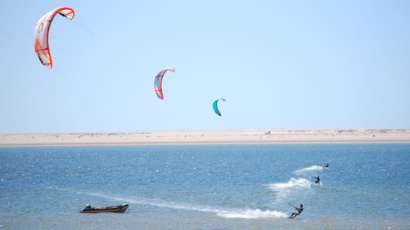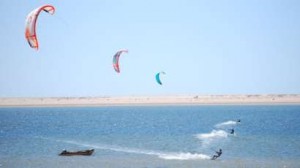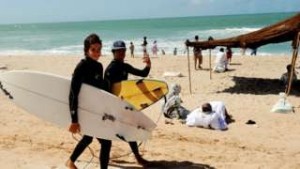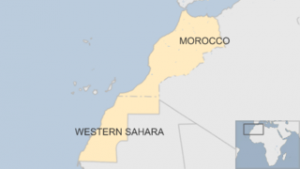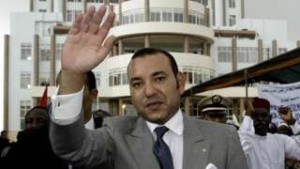BBC NEWS
Throughout the year, kitesurfers in need of an adrenaline rush travel the globe to glide on the waters of the Dakhla lagoon in Western Sahara. It is a unique seaside treat which the Moroccan government has turned into a touristic mirage, writes Camille Lavoix.
Some see it as Morocco reinforcing its hold on the region claimed by the Sahrawi people, an indigenous Berber ethnic group, over the past 40 years.
For others, the kitesurfing oasis is the best example of Morocco’s efforts to develop the disputed territory.
However, there is now a renewed risk of conflict in the region.
Flights always land in Dakhla at night. You can barely see the oasis in the middle of the desert. In the shadows, the dunes separate the lagoon from the Atlantic Ocean.
Every day a plane disgorges a new wave of tourists. With sunglasses on their heads, the passengers push their wind and surf boards into the hotels’ 4x4s.
The weather and strong winds make Dakhla coast a desired destination for surfers and kitesurfers
Some tourists might notice the numerous military convoys and the checkpoints dotted along the route.
But the majority do not imagine they are about to travel near a 2,700 km (1,700-mile) wall separating hostile forces which are just 120 metres apart. It is guarded by 120,000 Moroccan soldiers and packed with anti-personnel mines.
The day after their arrival, the tourists wake up in a small paradise in the middle of Western Sahara.
Listed by the United Nations as a Non-Self-Governing Territory, the former Spanish colony has been bound to hold a referendum on independence since a UN-brokered truce in 1991.
How did we get here?
- 1975-76: Morocco annexes two-thirds of Western Sahara after colonial power Spain withdraws.
- 1975-76: Polisario Front declares the Saharan Arab Democratic Republic (SADR), with a government-in-exile in Algeria. Thousands of Sahrawi refugees flee to western Algeria to set up camps.
- 1984: Morocco leaves the Organisation of African Unity (which later became the African Union) in protest at the SADR’s admission to the body.
- 1991: UN-monitored ceasefire begins in Western Sahara, but the territory’s status remains undecided and ceasefire violations are reported. The following decade sees much wrangling over a proposed referendum on the future of the territory but the deadlock is not broken.
- March 2016: Morocco threatens to pull its soldiers out of UN global peacekeeping missions in Western Sahara, after UN Secretary-General Ban Ki-moon uses the term “occupation” when referring to the territory.
- May 2016: Long-time Polisario Front leader Mohamed Abdelaziz dies aged 68
Profile: Western Sahara
Meanwhile tourism is booming.
“I think I can hear the sound of the waves,” said 19-year-old tourist Jules, who had difficulty sleeping on his first night here.
But it is actually the sound of the powerful wind which blows for more than 300 days a year, much to the kitesurfers’ delight.
Ten years ago, Jules’ father was one of the first visitors to set up his tent on this unexposed spot.
Since then, the desert has seen kitesurfing traffic jams, especially during the high season between April and November.
Richard Branson’s Virgin group sponsored the 2015 Kitesurfing World Cup series with Dakhla hosting the opening event.
Morocco’s ‘soft power’
For King Mohammed IV of Morocco, this spot is not merely a tourist attraction but is an ambitious project that can foster development and unity.
“This province has potential in terms of security, stability and infrastructures which allows it to become integrated in the economic cooperation at a continental level,” he said recently.
King Mohammed VI of Morocco says enhancing Dakhla’s tourism industry will improve collaboration and solidarity
Major investments have undoubtedly been made in the region which can today welcome tourists. Some hotel owners agree with the king’s assertion that the “conflict is an artificial one”.
Dakla Evasion Hotel owner Ghali is a Sahrawi but he is “happy [with] the Moroccan administration”.
“Not all Sahrawi disagree with the Moroccan government. A lot, like me, feel free and do not want to be independent,” he said.
“Of course, this touristic spot is in a conservative country, it is normal that politics and religion are touchy but it is safe and open.”
But others beg to differ – they believe the site is not safe enough for the many tourists who throng the desert resort.
“It is an illusion, a strategy; people die over there. I have seen a child with a missing foot. He played too close to the wall,” said French MP Herve Feron.
The legislator from the Parti Socialiste, which forms France’s government, realised the influence Morocco was trying to exert on Western Sahara when he decided to film a documentary on the culture of the Sahrawi people.
He described it as a “soft power Morocco tries to impose”, explaining that activists loyal to the North African country had tried to prove how “normal” the territory was by showing him photos of tourists kitesurfing.
He was also quick to chastise other politicians he claimed have looked the other way after receiving favours from the Moroccan government.
“I have been invited by the Moroccan consulate but it would make no sense to go to idyllic resorts. Since most politicians accept the invite, they stay quiet and take a coward’s stance on Western Sahara.”
‘My way to be free’
Abdellahi lbikam, 28, used to be a kitesurfing instructor in Dakhla.
“I was born there and tried to open my own business but I never received the authorisation from the Moroccan authorities,” he said.
“I fled the country because in 2013, I talked to an Irish journalist and consequently was fired from my job. Then my cousin died in jail in 2014, he was sick and no-one took him to the hospital. I was afraid for my life and asked for asylum in France.”
Locals in Western Sahara want equal opportunities in order to benefit from tourism boost
Living in Paris now, Mr Ibikam speaks freely about the “marginalisation” he suffered. “Lots of qualified Sahrawis are not hired anywhere,” he lamented.
“If the Moroccans want to organise sport and touristic events, let it be, but we would like to be able to work there too. There are only two Sahrawi kitesurfing teachers left.”
One Sahrawi, who did not want his name to be used, said he had to set up on his own, offering private lessons to tourists.
“Hotels would not hire me; the only one which did paid me only €200 (US$210; £170) a month for an extremely physical job,” he said.
“But I am not resentful towards the Moroccan people. Many of them are my friends and also struggle to make a living.
“I know it’s a government problem, a politician’s story. Every time I can, I explain the situation to tourists whom I teach. It is my way to be free.”
Abuses on both sides
Amnesty International has expressed concern over the fact that neither the Moroccan government nor the Polisario Front allows outside observers to investigate allegations of human rights abuses in the disputed region.
“The population lives under the daily threat of suffering abuses at the hands of the Moroccan authorities and of the Polisario,” the rights group said.
The Spanish authorities have reopened a case against new Polisario leader Brahim Ghali, who has been charged with genocide and crimes against humanity. Eleven Moroccans are also facing the same charges.
In September, the spokesperson for the UN Secretary General, Stephane Dujarric, warned that “any resumption of hostilities, with the potential to have wider regional implications, remains of significant concern”.
Soldiers belonging to both sides are stationed “approximately 120m” apart.
UN chief Ban Ki-Moon also expressed his “deep concern” over the situation.
Since April 2016, some 146 journalists and activists have been arrested or expelled for reporting on the conflict.
The tension between the two sides has, however, not prevented kitesurfers from seeking adventure at the disputed location, while hotels continue to earn good profits.




